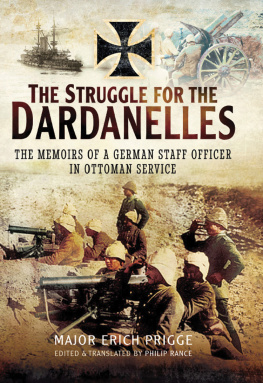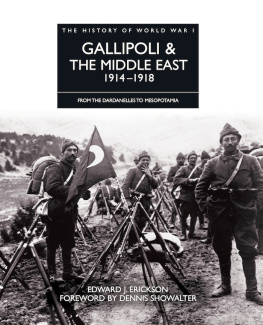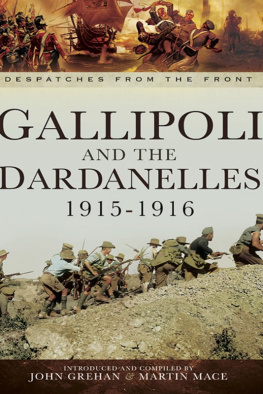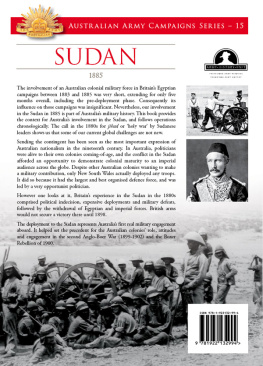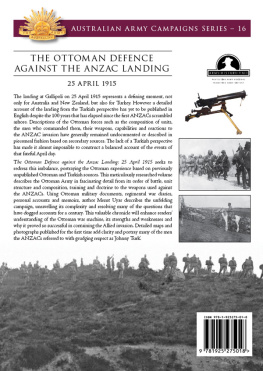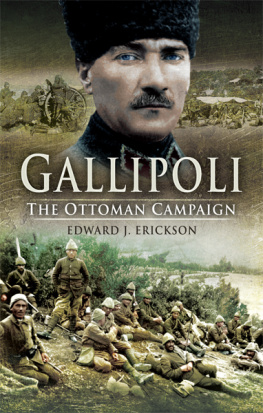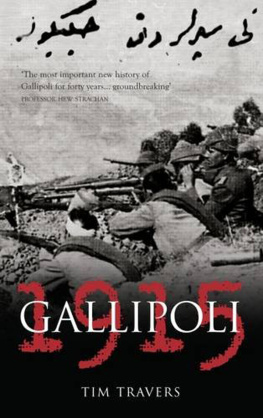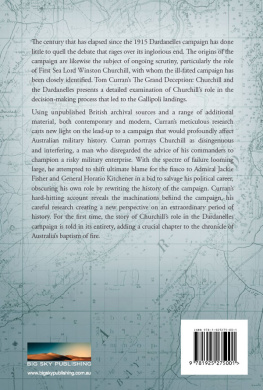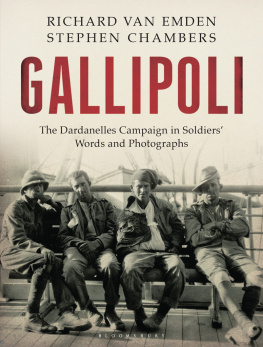
THE STRUGGLE FOR THE
DARDANELLES
THE STRUGGLE FOR THE
DARDANELLES
THE MEMOIRS OF A GERMAN STAFF OFFICER IN OTTOMAN SERVICE
an English translation of
Major Erich R. P RIGGE , Der Kampf um die Dardanellen (Veriag Gustav Kiepenheuer: Weimar 1916)
and
Anonymous [Erich P RIGGE ], Gallipoli, Der Kampf um den Orient.
Von einem Offizier aus dem Stabe des Marschalls Liman von Sanders
(Verlag August Scherl: Berlin 1916)
Translated with Introduction and Notes by
Philip Rance
First published in Great Britain in 2017 by
PEN & SWORD MILITARY
an imprint of
Pen and Sword Books Ltd
47 Church Street
Barnsley
South Yorkshire S70 2AS
Copyright Philip Rance, 2017
ISBN 978 1 78303 045 3
eISBN 978 1 47389 014 5
Mobi ISBN 978 1 47389 013 8
The right of Philip Rance to be identified as the author of this work has been asserted by him in accordance with the Copyright, Designs and Patents Act 1988.
A CIP record for this book is available from the British Library.
All rights reserved. No part of this book may be reproduced or transmitted in any form or by any means, electronic or mechanical including photocopying, recording or by any information storage and retrieval system, without permission from the Publisher in writing.
Pen & Sword Books Ltd incorporates the imprints of Pen & Sword Archaeology, Atlas, Aviation, Battleground, Discovery, Family History, History, Maritime, Military, Naval, Politics, Railways, Select, Social History, Transport, True Crime, and Claymore Press, Frontline Books, Leo Cooper, Praetorian Press, Remember When, Seaforth Publishing and Wharncliffe.
For a complete list of Pen and Sword titles please contact
Pen and Sword Books Limited
47 Church Street, Barnsley, South Yorkshire, S70 2AS, England
E-mail:
Website: www.pen-and-sword.co.uk
P REFACE AND A CKNOWLEDGEMENTS
A translators first debt is to the original author, an obligation that should be repaid by endeavouring not only to render the wording and substance of his text as closely as possible but also to appreciate his authorial motivation, choices and objectives, and the circumstances in which he wrote. Erich Prigge (18781955) was a long-serving cavalry officer in the German Imperial Army, who in early 1914 joined the recently inaugurated German Military Mission to the Ottoman Empire, an advisory delegation dispatched at the request of the Ottoman government to assist in the reform and modernization of the Ottoman army. Upon the outbreak of the First World War, when the terms of a German-Ottoman alliance and the exigencies of war obliged the personnel of the Military Mission to remain in Ottoman service, Major Prigge was reassigned as adjutant to the head of the Military Mission, Marshal Otto Liman von Sanders, a post Prigge would occupy until the end of the conflict. Accordingly, when in March 1915 Liman von Sanders was appointed commander-in-chief of the Ottoman Fifth Army, charged with orchestrating the defence of the Dardanelles against a looming Anglo-French invasion, Prigge became a well-placed eyewitness to the momentous and bitterly fought campaign waged for eight-and-a-half months on and around the Gallipoli peninsula (25 April 1915 to 9 January 1916). In September 1915, when the failure of the Allied expedition already seemed assured, Prigge was instructed to write an account of the battle that would counter the false hopes still peddled by British propaganda and alert the German-speaking public to the triumphant success achieved by the German-Ottoman military partnership. Over the following weeks, he compiled the manuscript on the battlefield, as the foreword explains, in the midst of the thundering of guns and the jangling of telephones at headquarters Prigge leaves his readers in little doubt as to which he found more irksome. The fruit of his efforts, Der Kampf um die Dardanellen (The Struggle for the Dardanelles), combining memoir, reportage and patriotic polemic, was on sale in Germany for only a few months at the beginning of 1916 before a complaint from the Ottoman General Headquarters induced the German authorities to order the books withdrawal from the market. Later the same year, a substantially revised, censored and extended version of Prigges text was published as Gallipoli, der Kampf um den Orient (Gallipoli, the Struggle for the Orient), anonymously ascribed to an officer of the staff of Marshal Liman von Sanders. The textual relationship between the two volumes has largely eluded subsequent historical scholarship and their common authorship is now rarely recognised or acknowledged. This is not an environment in which many authors would choose to write, nor a fate any author would wish for his work. In retrospect, Prigges achievement, for all its limitations, is more remarkable inasmuch as it was an exceptionally early, perhaps the earliest, published account of the Dardanelles campaign written by a combatant in any language. Composed without a direct literary model or antecedent, it became the foundational document of German-language memoirs and historical literature of the campaign.
A hundred years later, in contrast, this translator, in choosing to undertake the less onerous and purely academic exercise of introducing, translating and annotating the two versions of Prigges text for a modern anglophone readership, enjoyed security from conflict, freedom from censorship (if not from historical controversy) and the advantages of the immense Gallipoli-related bibliography , official, academic and popular that has accrued in the intervening century. A decade of academic nomadism within and between Germany and former Ottoman territories is neither a common nor obvious route to this extremely well-trodden field, but perhaps one that affords an opportunity to investigate some of its less-explored byways. The translation was completed while living in Istanbul in 2013-14, and the introduction and annotations written while living in Berlin in 2015. The parallelism with the career of Erich Prigge intermittently based in Istanbul in 191419 and resident in Berlin in 191940 was unintended but auspicious (even providential). In both metropolises, I was privileged to enjoy a congenial academic environment and generous financial support: a Residential Senior Research Fellowship from Ko University, Istanbul (201314), and a Renewed Senior Research Fellowship from the Alexander von Humboldt-Stiftung, hosted by the Freie Universitt, Berlin (2015). In both cases, my engagement with Prigges memoir was a Nebenprojekt , which at different times informed and relieved my primary research in Greco-Roman military literature. In this respect, the Homeric associations evoked by Prigge and other memoirists, poets and correspondents of the fighting on the plains of Troy in 1915 offered eloquent testimony to the Western tradition and enduring cultural continuities of man-destroying war.
The project benefited from access to major archives and assistance from their staff: Bundesarchiv-Militrarchiv, Freiburg im Breisgau; Geheimes Staatsarchiv Preuicher Kulturbesitz, Berlin; Politisches Archiv des Auswrtigen Amt, Berlin; The National Archives, Kew, London, and Thringisches Staatsarchiv Gotha. The staff of other archives and repositories provided information and/ or copies of documents: Centre des Archives diplomatiques, La Courneuve, Paris; Circondario dello Stato Civile di Locarno, Locarno; Landesarchiv Baden-Wrttemberg (Staatsarchiv Freiburg), Freiburg im Breisgau; Landesarchiv Berlin, Berlin; Landeshauptarchiv Sachsen-Anhalt (Abteilung Magdeburg); Samtgemeindearchiv Harsefeld, Niedersachsen; Stadtarchiv Magdeburg, Sachsen-Anhalt, and Thringisches Staatsarchiv Meiningen. The staff and holdings of several libraries proved indispensable: British Library, London; Universittsbibliothek der Freien Universitt Berlin; Universittsbibliothek der Humboldt-Universitt zu Berlin; Ko University Library, Istanbul, and Staatsbibliothek Berlin.
Next page
